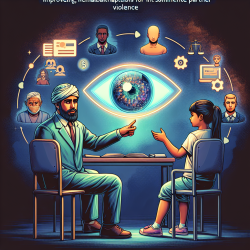As professionals in the field of rehabilitation, we are acutely aware of the complex needs of our clients. Among these needs, supporting survivors of Intimate Partner Violence (IPV) is both a critical and challenging aspect of our work. A recent scoping review titled Exploring the Relationships Between Rehabilitation and Survivors of Intimate Partner Violence: A Scoping Review offers valuable insights that can help us enhance our practices and improve outcomes for IPV survivors.
Understanding the Research
The review synthesized findings from 44 articles, focusing on four rehabilitation professions: occupational therapy, physiotherapy, speech-language pathology, and physiatry. Key areas explored included:
- Rehabilitation interventions for IPV survivors
- Knowledge and attitudes of rehabilitation professionals towards IPV
- Opportunities for intervention and support
Key Findings and Recommendations
Rehabilitation Interventions
The review highlighted the effectiveness of tailored interventions that address life skills and meaningful engagement. Despite the variability in approaches, high satisfaction and functional improvements were reported, emphasizing the importance of individualized care.
Knowledge and Attitudes
There is a significant gap in IPV-related education among rehabilitation professionals. Many reported feeling underprepared to support IPV survivors and expressed a need for more training and protocols for identification.
Opportunities for Support
Several recommendations were made to enhance support for IPV survivors:
- Implementing trauma-informed approaches
- Developing local resource networks for referrals
- Collaborating with other healthcare and community services
Addressing Brain Injury and Disability
The intersection of brain injury, disability, and IPV is critical yet underexplored. Only a small fraction of the studies addressed these issues, highlighting the need for rehabilitation professionals to be vigilant in identifying and supporting survivors with brain injuries.
Implementing Changes in Practice
To better support IPV survivors, we recommend the following system-level changes:
- Integrate IPV awareness and brain injury screening into rehabilitation curricula.
- Promote continuing education on IPV through accreditation bodies.
- Foster cross-sectoral collaboration between healthcare and IPV services.
For individual practitioners, consider the possibility of IPV among clients with disabilities or brain injuries, and strive to provide nonjudgmental, trauma-informed care.
Future Research Directions
Future research should explore:
- The impact of race, ethnicity, and culture on IPV experiences and rehabilitation.
- Rehabilitation needs of men and gender-diverse individuals experiencing IPV.
- Effective interventions and training programs for rehabilitation professionals.
To read the original research paper, please follow this link: Exploring the Relationships Between Rehabilitation and Survivors of Intimate Partner Violence: A Scoping Review.
By integrating these insights into our practice, we can make significant strides in supporting IPV survivors and improving their rehabilitation outcomes.










